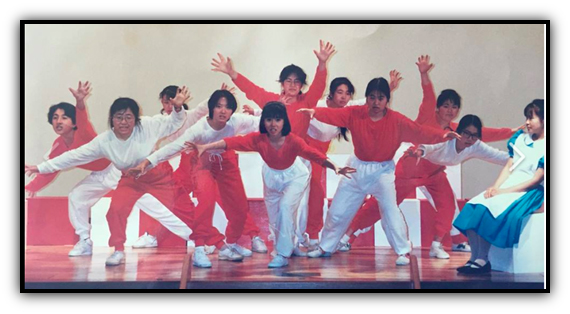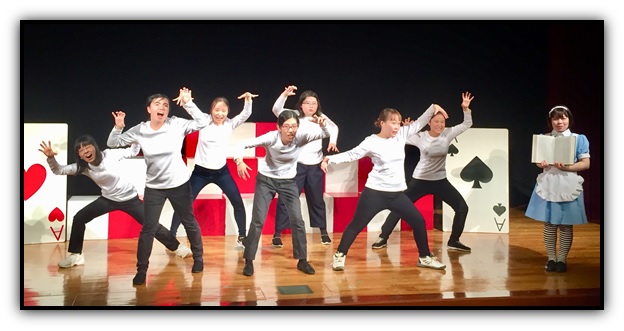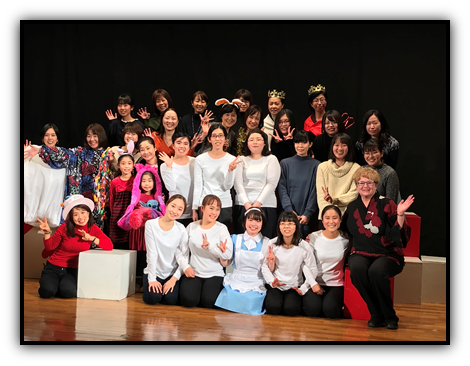
ALICE (1988)
(Shoko Doi, Miki Goto, Momoe Kimura, Miwa Mukaiyama, Yuriko Gotanda, Kimie Kawaguchi, Tomoko Korekado, Yumiko Miyake, Hiromi Fukuda, Akie Suzuki & Kyoko Fukui)
It was my second year working at Notre Dame Seishin University when the English Drama Club staged Alice for the first time. The drama club I belonged to at Trinity College in Washington DC (NDSU’s sister school) had created the “ensemble” production when I was a student a few years earlier, and it was one of my favorites. This first group of actors (above) built the chess board setting in the background of the picture. Those very same wooden boxes have been repainted and reused by the English Drama Club dozens of times throughout the years. They’ve been used in other ensemble shows we’ve done, such as Scrooge, and Oz; they’ve also become fireplaces, ovens, an obscure kind of netherworld in Tea; and they’ve been used as hidden platforms behind walls at the top of staircases and behind front porches.
And they were most recently painted once again for our fifth version of Alice which was held on December 6 & 8 of this month.

ALICE (2019)
(Misaki Yoshida, Eri Yanagimoto, Hitose Fukutake, Runa Ishikawa,
Yuki Ando, Kyoko Ono, Eri Sato & Wakana Yoshida)
(Misaki Yoshida, Eri Yanagimoto, Hitose Fukutake, Runa Ishikawa,
Yuki Ando, Kyoko Ono, Eri Sato & Wakana Yoshida)
As I mentioned, Alice is an ensemble play. The word “ensemble” comes from the French word meaning “together.” In an ensemble play, the cast acts as narrators, speaking directly to the audience, and sometimes acting together as one living being (such as the sleeping White King in Alice), or as objects (such as doors, tables, or clocks, also in Alice). Throughout the play, members of the ensemble step aside and put on a certain costume, in view of the audience, and change into that character for a short time. After acting as the White Rabbit, for example, the ears come off and the actor is again a member of the group of narrators. When a scene is going on that the ensemble members are not involved in, they sit on the stage and watch over the action, just as the people in the audience are doing. It’s a dynamic style of ‘play.’ One of my drama directors in college used to tell us, “Play is a noun and a verb!” “Play,” the noun, is the word for a dramatic work presented on a stage. But “play,” the verb, means to engage in an activity simply for pleasure, as children do. And that’s what we do in the English Drama Club, I believe: we PLAY!
We invited past EDC graduates who acted in previous versions of Alice to come and see this one, and 15 OGs came from near and (very!) far, to have that natsukashii feeling again. Here is a picture taken after our show on 12/8. It was so special to be together with everyone and to know that the English Drama Club is the family that connects us all, after all these years, and into the future. I love my EDC family . . .

・クラブ・サークル
・英語演劇部
・英語英文学科
・SWIERSKI Carolyn Lee(キャロリン スワスキー 准教授)(教員紹介)



